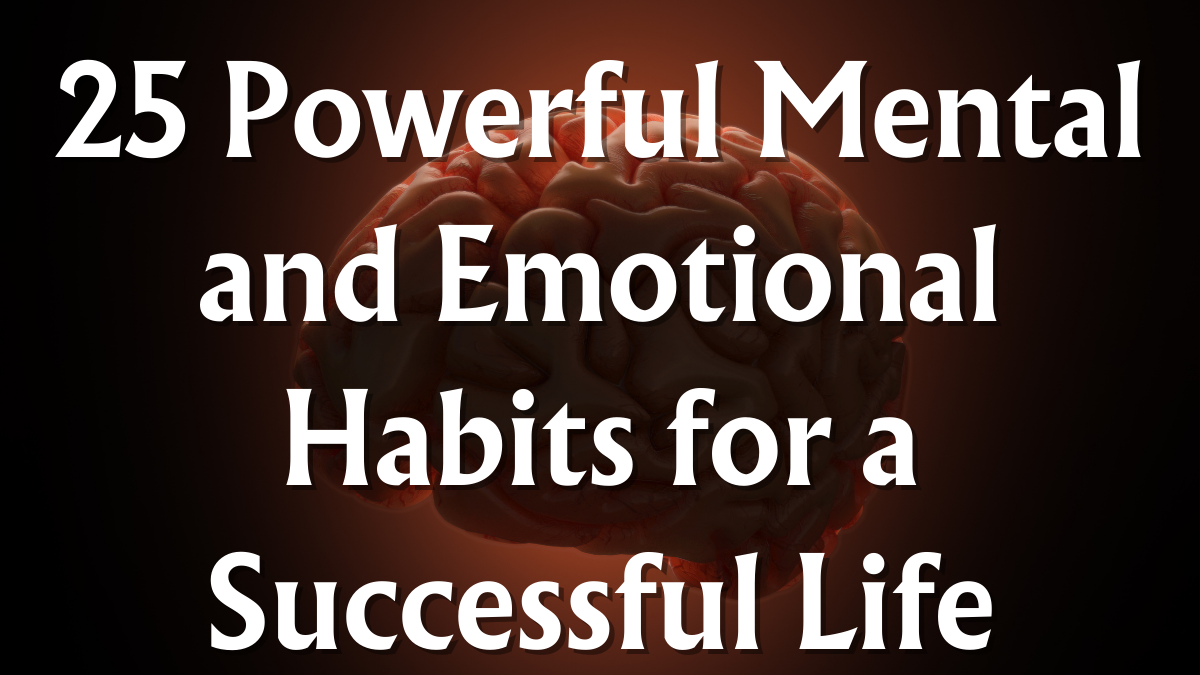Nurturing Your Mind: 25 Powerful Mental and Emotional Habits for Lasting Well-being
25 Powerful Mental and Emotional Habits for Well-being
Maintaining mental and emotional well-being is a lifelong journey that involves cultivating positive habits to foster resilience, happiness, and overall life satisfaction. Here are 25 powerful mental and emotional habits to enhance your well-being:

1. Practice Gratitude Daily (Gratitude Journaling):
Begin or end each day by reflecting on things you’re grateful for. This simple habit can shift your focus towards positivity.

2. Mindfulness Meditation:
Incorporate mindfulness meditation into your routine to stay present, reduce stress, and enhance overall mental clarity.

3. Positive Affirmations:
Create and repeat positive affirmations daily to build self-confidence and promote a positive self-image.

4. Cultivate Self-Compassion:
Be kind to yourself during challenging times. Treat yourself with the same kindness you would offer to a friend facing difficulties.

5. Set Realistic Goals:
Establish achievable goals, breaking them down into smaller steps. Celebrate your accomplishments, no matter how small.

6. Develop Healthy Coping Mechanisms:
Identify and practice healthy ways to cope with stress, such as deep breathing, exercise, or engaging in hobbies.

7. Establish Boundaries:
Learn to set and maintain healthy boundaries in your personal and professional life to avoid burnout and stress.

8. Prioritize Self-Care:
Make self-care a non-negotiable part of your routine. It could be anything from taking a bubble bath to reading a good book.

9. Foster Positive Relationships:
Surround yourself with supportive and positive individuals who uplift and inspire you.

10. Embrace Failure as a Learning Opportunity:
See failure as a chance to learn and grow rather than as a negative reflection of your abilities.

11. Practice Deep Breathing:
Incorporate deep-breathing exercises to manage stress, calm the mind, and improve overall emotional well-being.

12. Develop Resilience:
View challenges as opportunities for growth. Develop resilience by learning from setbacks and adapting to change.

13. Regular Physical Exercise:
Engage in regular physical activity to release endorphins, boost mood, and improve overall mental health.

14. Foster a Growth Mindset:
Cultivate a mindset that embraces learning, improvement, and adaptation to new experiences.

15. Disconnect from Technology:
Take breaks from digital devices to reduce information overload and foster genuine human connections.

16. Engage in Creative Outlets:
Express yourself through creative activities such as writing, drawing, or playing a musical instrument.

17. Prioritize Quality Sleep:
Establish a consistent sleep routine to support mental and emotional well-being. Lack of sleep can impact mood and cognitive function.

18. Learn to Say No:
Recognize your limits and say no when necessary to avoid overwhelm and maintain balance in your life.

19. Practice Mindful Eating:
Be present during meals, savoring each bite. Pay attention to hunger and fullness cues.

20. Foster a Positive Self-Image:
Challenge negative self-talk and focus on your strengths. Treat yourself with the same kindness you offer others.

21. Engage in Acts of Kindness:
Perform acts of kindness for others. Helping others can create a sense of fulfillment and joy.

22. Develop a Support System:
Build a network of supportive friends and family to share your thoughts and feelings with during challenging times.

23. Embrace Change:
Accept that change is a natural part of life. Embrace it as an opportunity for personal growth and new experiences.

24. Engage in Lifelong Learning:
Cultivate a curious mindset by continually seeking opportunities for learning and personal development.

25. Seek Professional Support:
If needed, don’t hesitate to seek guidance from mental health professionals who can offer support and coping strategies.
Incorporating these mental and emotional habits into your daily life can contribute to a more fulfilling and resilient well-being. Remember, it’s okay to seek support when needed, and taking proactive steps toward mental and emotional health is a sign of strength.






